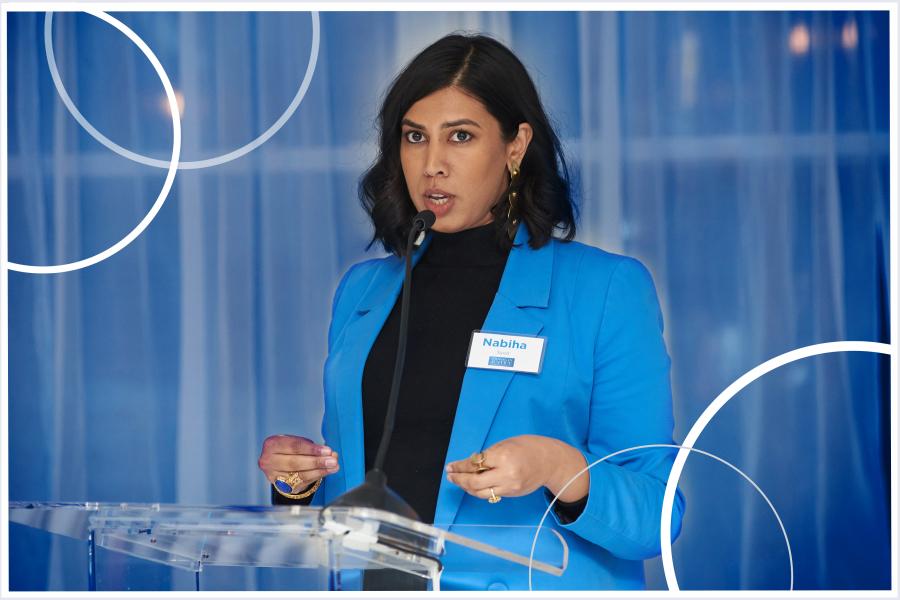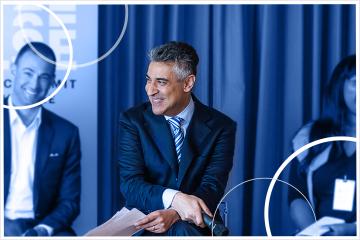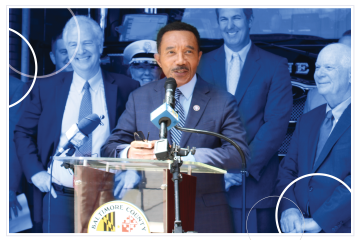The Johns Hopkins Changemakers Profile is a monthly feature spotlighting the impact of Johns Hopkins alumni in positions of influence in Washington, D.C., policymaking circles.
As CEO of a new investigative journalism nonprofit called The Markup, Nabiha Syed occupies a prominent position on the front lines of one of Washington's biggest policy concerns: Big Tech. The award-winning online news outlet's motto—popular these days in Washington policymaking circles—is: "Big Tech Is Watching You. We Are Watching Big Tech."
Syed, 37, has already proven the impact The Markup can have by applying data-intensive investigative journalism to expose the practices of technology behemoths like Facebook, Amazon, and Twitter.
When Sen. Ron Wyden introduced the Algorithmic Accountability Act of 2022 last February, the Oregon Democrat cited The Markup's investigation into "poorly designed mortgage-approval algorithms that inexplicably denied loans to applicants."
A month later in March, members of the House of Representatives' antitrust subcommittee relied on The Markup's investigation of how Amazon treats third-party sellers when asking the Department of Justice to investigate the online retailer for trying to "thwart the Committee's efforts to uncover the truth about Amazon's business practices."
Occupation: Chief Executive Officer, The Markup
Age: 37
Hometown: Orange County, California; Brooklyn, New York
Education: JHU, bachelor's degree, Anthropology and International Studies, 2007; Yale Law School, J.D., 2010; University of Oxford, M.St. Law, 2011
And in December, U.S. Sens. Elizabeth Warren and Bernie Sanders, along with several other senators and representatives, used a Markup investigation to support the harsh letters they sent to the chief executives of Google, Meta, H&R Block, and other tax preparation companies for "secretly transmitting sensitive financial information" to Facebook.
Such investigations are not the first time the 37-year-old media lawyer has had to navigate high stakes scenarios involving investigative journalism and federal politics. As BuzzFeed's vice president of legal and associate general counsel, she helped the publication decide to publish the Steele dossier in 2017 with its unverified allegations against then-President Donald Trump.
The daughter of Pakistani immigrants, Syed arrived at Johns Hopkins in 2003 from Orange County, California, having never heard of Baltimore before applying. And she displayed no penchant for journalism while double majoring in anthropology and international studies.
Media law became a passion after Syed started Yale Law School, where she co-founded the Media Freedom and Information Access Clinic. She then specialized in comparative media law for a Master of Science in Teaching degree from Oxford University.
In 2009, while at Oxford, she became fascinated with the ways technology was tearing down the traditional gatekeepers of news, such as legacy print and television news outlets. She began working on a thesis on Wikileaks while in London and scored an interview with Julian Assange, the website's founder whose disclosures in 2010 of U.S. airstrikes that killed Iraqi civilians would render him a pariah to the U.S. government.
Syed landed a First Amendment fellowship with The New York Times and an associate's job at Levine Sullivan Koch & Schulz, a media law firm that helped guide The Guardian's decision to publish Edward Snowden's leaked disclosures about the National Security Agency.
She left BuzzFeed in 2019 and joined The Markup, which has been funded by $23 million in grants, primarily from the Ford Foundation, Luminate, and the foundation of Craigslist founder Craig Newmark. "The Markup does really important work, helps defend the country, and Nabiha's leadership is a vital part of that success," Newmark said in an email.
Syed serves as a Knight Fellow for the Institute for Data, Democracy and Politics at George Washington University, where she has been working on a project that aims to convene policymakers, activists, journalists, and others to explore how the world can and should incorporate technology in the future. And she is an advisory council member for the Center for Democracy & Technology in Washington, an advocacy organization that gathers "thought leaders to find innovative and practical solutions to the policy challenges surrounding the Internet" and provide "leadership and advocacy to help shape public policy and industry best practices."
Throughout her career, Syed has adhered to a fearless ethos she learned from her grandmother, Majida Rizvi, the first female judge of a high court in Pakistan.
"You don't have to wait for permission," Syed said. "You don't have to wait for anything but an opportunity, and then you do the work."
Posted in Politics+Society










